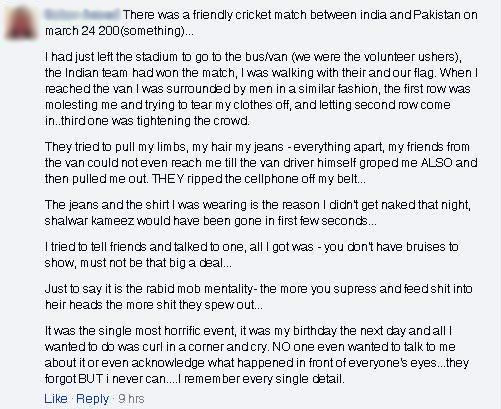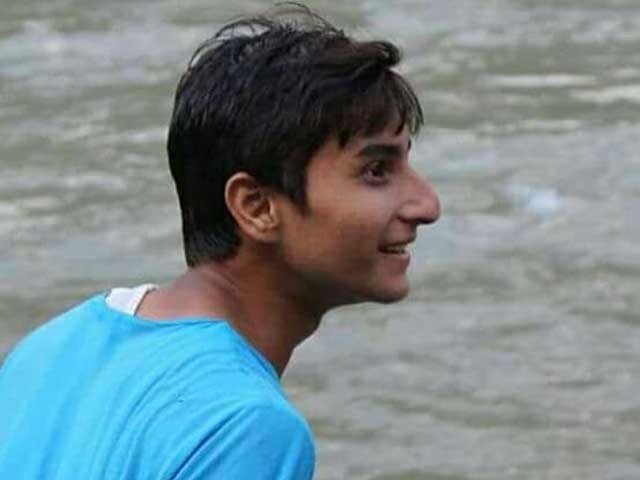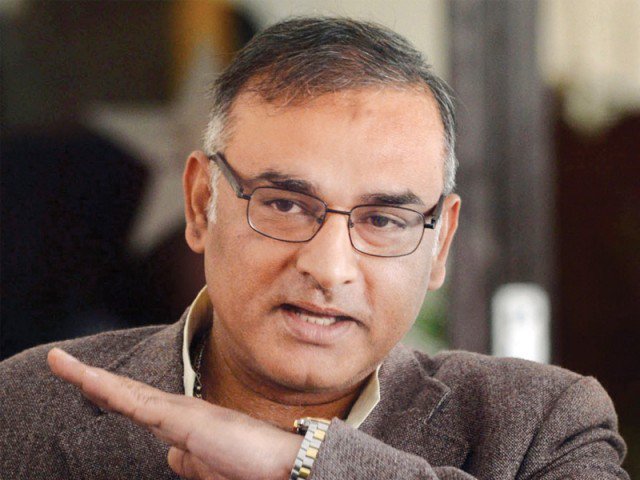
They call it Taharrush gamea
It is about time we said no to misogyny, and all the painful local practices that stem from it.
Author’s note: Islam has nothing to do with taharrush gamea; the act contradicts the teachings of the religion. At the same time, there is no denying where the incidents are taking place, and who the perpetrators are. Denying this out of some misplaced sense of political correctness has only exacerbated the issue.
Not surprisingly, the attacks are more sophisticated than a coordinated assault from a pack of hyenas.
These are predators after all.
The incidents usually take place in the cold black of the night at locations where women are more vulnerable; at the end of an alley, near a tunnel, in the middle of a large crowd at a concert, protest, or festival.
By the time the body signals the fight or flight response, it is usually too late, for you find yourself caught in the eye of a whirlwind of sexually depraved human bodies, all waiting for a chance to do you harm.
It is like being sandwiched in several circles of hell.
The first circle attacks you wildly, hungrily grabbing at your hair, face, mouth, breasts, hips, legs, or genitals. If your clothes are torn off somehow, the fingers of dozens of men will enter either cavity near the centre of your legs, raping you with their hands, if not with their own genitals. You scream, beg, and plead, but this only encourages them. Through tears you desperately scan the crowd for your allies, but they have either been beaten into submission or have gone to seek help.
The second circle surrounds you, waiting their turn, expending unspent energy by kicking at your ribs, pulling at your hair, or clawing at your body when they can. To encourage others or perhaps to alleviate their own guilt, they loudly call you a whore, slut, or even a Jew or a Hindu; anything to justify their actions.
The third circle acts as a shield. Distracting onlookers by trying to appear casual, these men form a barrier, almost hoping you will break free so that they can get in on the action.
For anyone who believes this to be an exaggeration, these disturbing videos should prove to be educational:
Authorities and journalists say the act is called taharrush gamea.
Responding to the New Years’s Eve attacks in Cologne, The Federal Criminal Police Office (BKA) said,
“Such crimes are committed by groups of young men… mostly when there are large gatherings of people, such as demonstrations. They range from sexual harassment to rape.”
Veteran war journalist Lara Logan survived taharrush gamea in the heart of Cairo after a crowd of 100,000 met at Tahrir Square to celebrate the end of Hosni Mubarak’s rule.
Describing her ordeal to 60 Minutes in an emotional interview, she shared how the crowd targeted her, tearing off her clothes and sexually assaulting her multiple times,
“And I am screaming, thinking if I scream, if they know, they’re gonna stop, you know. Someone’s gonna stop them. Or they’re gonna stop themselves. Because this is wrong. And it was the opposite. Because the more I screamed, it turned them into a frenzy. And I feel them tearing at my clothing. I think my shirt, my sweater was torn off completely. My shirt was around my neck. I felt the moment that my bra tore. They tore the metal clips of my bra. They tore those open. And I felt that because the air, I felt the air on my chest, on my skin. And I felt them tear out, they literally just tore my pants to shreds. And then I felt my underwear go. And I remember looking up, when my clothes gave way, I remember looking up and seeing them taking pictures with their cell phones, the flashes of their cell phone cameras.”
As the crowd started to pull off her hair and flesh like monsters from a zombie film, Logan began to lose hope, until she thought of her one-year-old daughter and two-year-old son,
“I had to fight for them. And that’s when I said, ‘Okay, it’s about staying alive now. I have to just surrender to the sexual assault. What more can they do now? They are inside you everywhere.’ So the only thing to fight for, left to fight for, was my life.”
Thankfully, Logan found solace amongst a camp of Egyptian women where she was eventually rescued by soldiers. Her recovery process at the hospital was difficult,
“My muscles were so unbelievably sore, because they were literally stretched from the mob trying to tear my limbs off my body. My joints, every joint in my body was distended. And then they, the more intimate injuries, the injuries, the tearing inside. And the mark of their hands, their fingers all over my body, cuts and everything you could imagine”
In the same location, a female Dutch journalist also fell victim to the so called game. The Dutch embassy later released a statement,
“A Dutch woman of 22 was attacked in Tahrir Square on Friday evening. The Netherlands embassy has assisted the victim, and after receiving emergency treatment in a Cairo hospital she was repatriated to the Netherlands in the company of family. The victim has cooperated with an investigation started by the Egyptian authorities. In the interest of the privacy of the victim, no further information will be given.”
The Hollywood Reporter described her injuries,
“News of the violent sexual assault that followed was first reported by Dina Zakaria, a journalist for Egypt 25 news channel. Writing on her Facebook page, Zakaria said that the woman “was raped by men who dub themselves revolutionists” and that her “condition is severe and she is hospitalised.”
Another survivor was France 24 journalist Sonia Dridi. The Guardian shares how her colleague protected her from the mob,
“When we went back for the second live shot the crowd was worse, it was really hard to control the crowd. If you see the video you can see me popping up on the fringe telling people let her work. By the time it was finished everybody was too close and no one was listening to us. I told Sonia to just go straight to (the shop) Hardee’s and wait for me because I didn’t want her to wait with this crowd of feral youths.”
According to The Guardian, on a single night, ‘more than 80 women were subjected to mob sexual assaults, harassment or rape.’
Reportedly, at least one woman was raped by a sharp object.
Advocate Soraya Bahgat expanded on the scope of the issue,
“Egypt is full of sexual harassment and people have become desensitised to it – but this is a step up. We’re talking about mob sexual assaults, from stripping women naked and dragging them on the floor – to rape.”
Survivors of sexual assault in Egypt have long held their silence. As Al Jazeera reported, the authorities are part of the problem,
“A new study by a human-rights group accuses Egyptian security forces of increasingly using sexual violence against men, women and children with impunity. Released on Tuesday, the report by the International Federation for Human Rights (FIDH), titled Exposing state hypocrisy: Sexual violence by security forces in Egypt, indicates a surge in sexual violence perpetrated by Egyptian security forces since the military takeover in 2013.”
After the influx of migrants into Europe, smaller scale versions of these attacks have started to take place in the European Union. This has led to several sources terming taharrush gamea as a Muslim or an Arab problem. This is not exactly true.
For one, the migrants pinpointed in Europe for conducting these assaults have not only been of Arab descent, but North African and Afghani. What’s more, aside from Egypt, I can share several instances of such incidents taking place in large gatherings in Afghanistan and even Pakistan.
Take for example the massive Pakistan Tehreek-e-Insaf (PTI) rally in 2013. Undoubtedly, the political party has admirably created a safe space for female supporters to take part in their massive jalsas (protests). Yet even PTI can only do so much.
At Minar-e-Pakistan, under the cover of darkness and rain, numerous men sexually assaulted women drenched by the thunderstorm. When some bravely chose to share tales of their trauma, they were labelled as liars by our sexist public.
This pigheaded sense of denial is part of the issue.
The Apprentice star, Saira Khan, was sexually assaulted by a crowd in Pakistan while filming a documentary for the BBC,
“I was dressed in the native shalwaar kameez – long baggy trousers and a tunic to cover my body. I wore a scarf around my head to show respect. All that was visible were my hands and face. With much persuasion, my director David allowed me to walk by myself near a crowd of men. I realised within five minutes what an idiot I had been – I was the only woman in this crowd. I was spotted and within minutes a group of men had circled me and hands were all over me while bodies pressed up against mine.”
Again, not surprisingly, The Express Tribune readers posted comments on the story’s Facebook page, calling Saira Khan a liar for sharing her story years after it took place, not appreciating the strength it took for her to finally speak of the torment.
There is also the case of a relative of mine. While volunteering during a sporting event, she was sexually assaulted by a mob in Pakistan right outside of a cricket stadium. Seen carrying flags of both India and Pakistan, perhaps her attackers used the Indian flag as some sort of depraved validation.
 Photo: Screenshot
Photo: ScreenshotOn Twitter, some have taken to describing this as a Muslim tradition, which isn’t true, as Islam doesn’t condone such a thing. But there is no denying that it is taking place at the hands of those of Muslim origin. Of course, the common denominator here isn’t any religion, but men who originate from misogynist nations where women aren’t respected as equals in society, and are objectified as things to derive use from.
https://twitter.com/AliBambii/status/687559426480422912
So #taharrush...is just the rich, vibrant tapestry of multiculturalism?@CounterMoonbat#RapeCulture#RadicalIslam pic.twitter.com/3FQeGZ3R3Y
— Linda Suhler, PhD (@LindaSuhler) January 14, 2016
https://twitter.com/Ann_Tagonist_/status/686587128461930498
According to the BBC, on New Year’s Eve, in Cologne, ‘over 500 criminal complaints were filed, 40 per cent alleging sexual assault.’
Officials say that ‘nearly all’ of the suspects are ‘people with an immigrant background’.
To be clear, over a million migrants have landed in Europe, escaping war and unspeakable horrors, and this seems to be a tiny percentage. Yet, even this small number can turn the European way of life on its head. Already, European women are claiming to feel fear like they’ve never felt before.
The solution isn’t to shut the door on those escaping conflict, but to more effectively screen those coming in, and to create programs that help refugees integrate into an alien culture. As The New York Times reports, Norway has begun a promising program,
“When he first arrived in Europe, Abdu Osman Kelifa, a Muslim asylum seeker from the Horn of Africa, was shocked to see women in skimpy clothes drinking alcohol and kissing in public. Back home, he said, only prostitutes do that, and in locally made movies couples “only hug but never kiss.”
Confused, Mr Kelifa volunteered to take part in a pioneering and, in some quarters, controversial program that seeks to prevent sexual and other violence by helping male immigrants from societies that are largely segregated or in which women show neither flesh nor public affection to adapt to more open European societies.
“Men have weaknesses and when they see someone smiling it is difficult to control,”
Mr Kelifa said, explaining that in his own country, Eritrea, if someone wants a lady he can just take her and he will not be punished, at least not by the police.
Norway, he said, treats women differently,
“They can do any job from prime minister to truck driver and have the right to relax” in bars or on the street without being bothered, he added.
To tackle the cause of the issue, we first have to drag our heads out of the sand and accept the problem exists. Strangely, denial is from both sides. While we continue to pretend this is all a conspiracy by the West, some Western nations, ironically enough, have been covering up such cases out of political correctness.
For example, Swedish officials have been widely accused of covering up attacks at a musical festival in 2014, because the culprits were migrants.
The Guardian,
“These are so-called refugee youths, specifically from Afghanistan. Several of the gang were arrested for sexual molestation,” one police memo said.”
The pattern has many shades of taharrush gamea.
The Guardian,
During the 2014 festival, organisers picked up on rumours of a new phenomenon, said Roger Ticoalu, head of events at the Stockholm city administration.
“It was a modus operandi that we had never seen before: large groups of young men who surround girls and molest them,” Roger Ticoalu said.
“In the cases where we were able to apprehend suspects, they were with a foreign background, newly arrived refugees aged 17-20, who had come to Sweden without their families.”
By opening up its borders to refugees, Europe has helped over a million people fleeing terrible circumstances. At the same time, this sudden entry is far from an organic process. Many of those entering Europe come from different ideals and belief systems resulting in a clash of values.
With the incidents of taharrush gamea growing in number, it is almost as if the leaders in Europe were suddenly dragged by their ears to the florist, so that they could finally smell the roses.
As Saira Khan said,
“Here in the West, we need to stop burying our heads in the sand and accept that Asian, Arab and African men grow up in societies where misogyny is the cultural norm. We need to talk about it so we can change it.
Ignoring it, like the BBC did, is just condoning it. If we are allowing people to come in, we must also make sure that we are not blinded by some truths which are hard to swallow.
It is a betrayal of the truth, of the majority of decent migrants and – most of all – of women who must not see progress turned back for the sake of accommodating a medieval world view.”
But while the European nations are being forced to wake up, we in the Middle East, North Africa, and parts of Asia still feign ignorance.
When will we begin to accept reality?
Incredibly, the deniers are mostly men, but women as well. Perhaps subconsciously, we pretend these problems don’t exist, because accepting them would require a painful examination of our belief system.
Take for example, the hijab, a sexist garb that many Islamic scholars argue is cultural rather than religious. Yet many who wear the hijab will fight tooth and nail for it, obviously so emotionally invested in the cloth that they fail to realise the onus is on the man, and not the woman, to deny sexual assault. It has been repeatedly documented that many of these men simply use the lack of hijab as validation for sexual assault.
It is about time we said no to misogyny, and all the painful local practices that stem from it.




COMMENTS (55)
Comments are moderated and generally will be posted if they are on-topic and not abusive.
For more information, please see our Comments FAQ